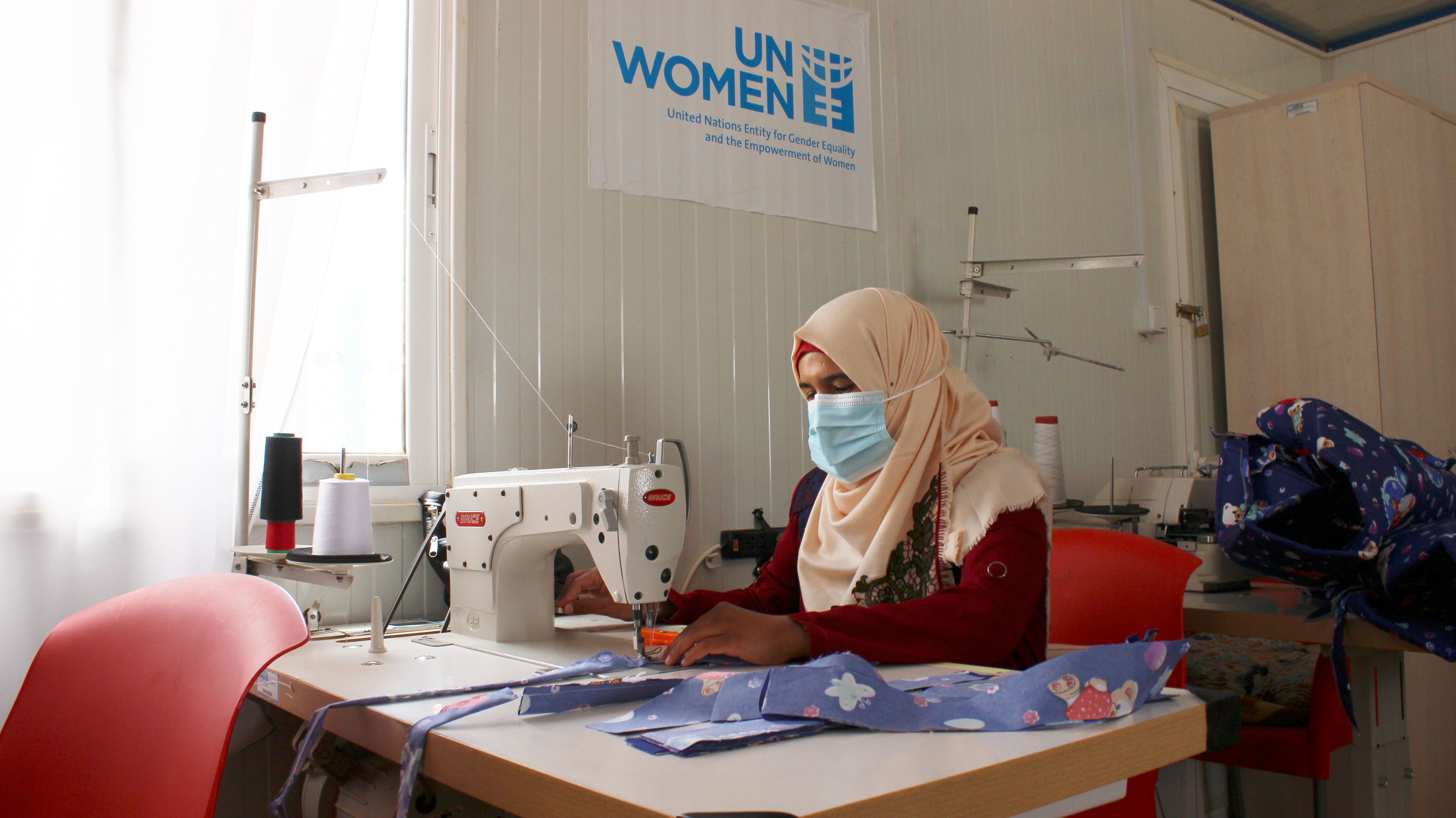From where I stand: “Women can work and share household responsibilities to provide a better life for their families”
Date:
Fatma Mohammad Rahil, 33 and mother of five, joined the UN Women’s Oasis centre in the Azraq refugee camp to be able support her family financially. She discusses barriers faced by women and the goals she was able to achieve through an enabling working environment.

![]() When we arrived in the camp in 2015, we did not have enough money to buy clothes and shoes. Due to the weather, clothes wore out easily. We only had two sponges to clean the entire caravan. My husband used to be a farmer in Syria, and he was struggling to find a job in the camp. We had to borrow money to make ends meet. At that time, I also had to visit the doctor regularly as my 3-month-old baby had allergy and difficulty in breathing. I was feeling powerless, a burden to my family. Although I had some experience in tailoring, my options were also limited.
When we arrived in the camp in 2015, we did not have enough money to buy clothes and shoes. Due to the weather, clothes wore out easily. We only had two sponges to clean the entire caravan. My husband used to be a farmer in Syria, and he was struggling to find a job in the camp. We had to borrow money to make ends meet. At that time, I also had to visit the doctor regularly as my 3-month-old baby had allergy and difficulty in breathing. I was feeling powerless, a burden to my family. Although I had some experience in tailoring, my options were also limited.
You know, in our community it is not considered suitable for men and women to work in the same place. Despite the hardships, many Syrian women don’t work because their fathers and husbands won’t give permission to stay in mixed environments. Many women want to work in the Oasis for the services offered. For example, it was important for me to be able to bring the children with me at work and to know they were safe in the childcare and the nursery. They used to be so excited and could not wait for the weekend to be over to start again their classes on Sundays. The Oasis center became more than a workplace to me, it feels like a family.
Since I joined the tailoring team, I was able to pay back my debts and to buy some essentials, like clothes, a washing machine, and a fridge. The process is also way easier, as I can withdraw cash anytime I need via the blockchain system at the supermarket. After two years of economic hardships, this was a relief. Life at home also improved. I feel I have more say in making decisions for what we need to buy.
My message to other women is: you are worthy, you can work, and you can share household responsibilities to provide a better life for your family. Personally, I want to continue working. Hopefully one day when I can go back to Syria, I would like to set up a small sewing business.
![]()
![]()
![]() The UN Women’s Oasis center in the Azraq refugee camp provides women refugees with sustainable livelihood opportunities, gender-based violence prevention, access to education and skills development, civic leadership and participation, as well as advocacy platforms to engage men and boys. As result of the COVID-19 pandemic, UN Women rapidly transitioned its incentive-based volunteer programming into direct cash assistance, leveraging blockchain technology to transfer cash digitally to Syrian women refugees in camp settings. This initiative is generously supported by the Government of Australia through the Department of Foreign Affairs and Trade (DFAT).
The UN Women’s Oasis center in the Azraq refugee camp provides women refugees with sustainable livelihood opportunities, gender-based violence prevention, access to education and skills development, civic leadership and participation, as well as advocacy platforms to engage men and boys. As result of the COVID-19 pandemic, UN Women rapidly transitioned its incentive-based volunteer programming into direct cash assistance, leveraging blockchain technology to transfer cash digitally to Syrian women refugees in camp settings. This initiative is generously supported by the Government of Australia through the Department of Foreign Affairs and Trade (DFAT).